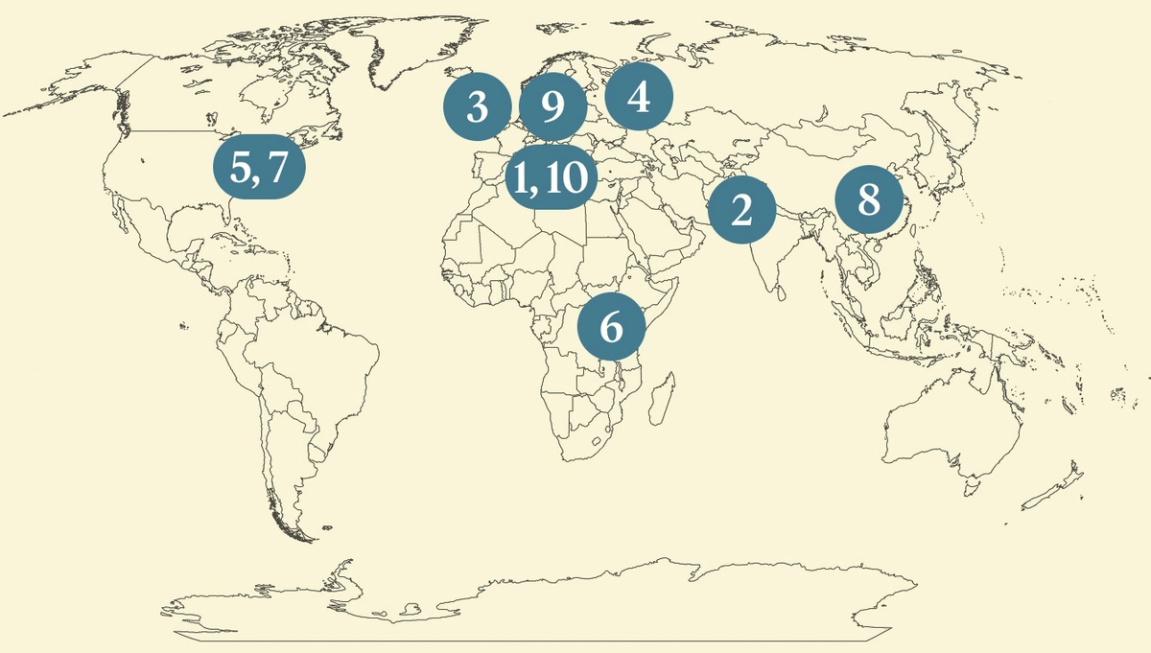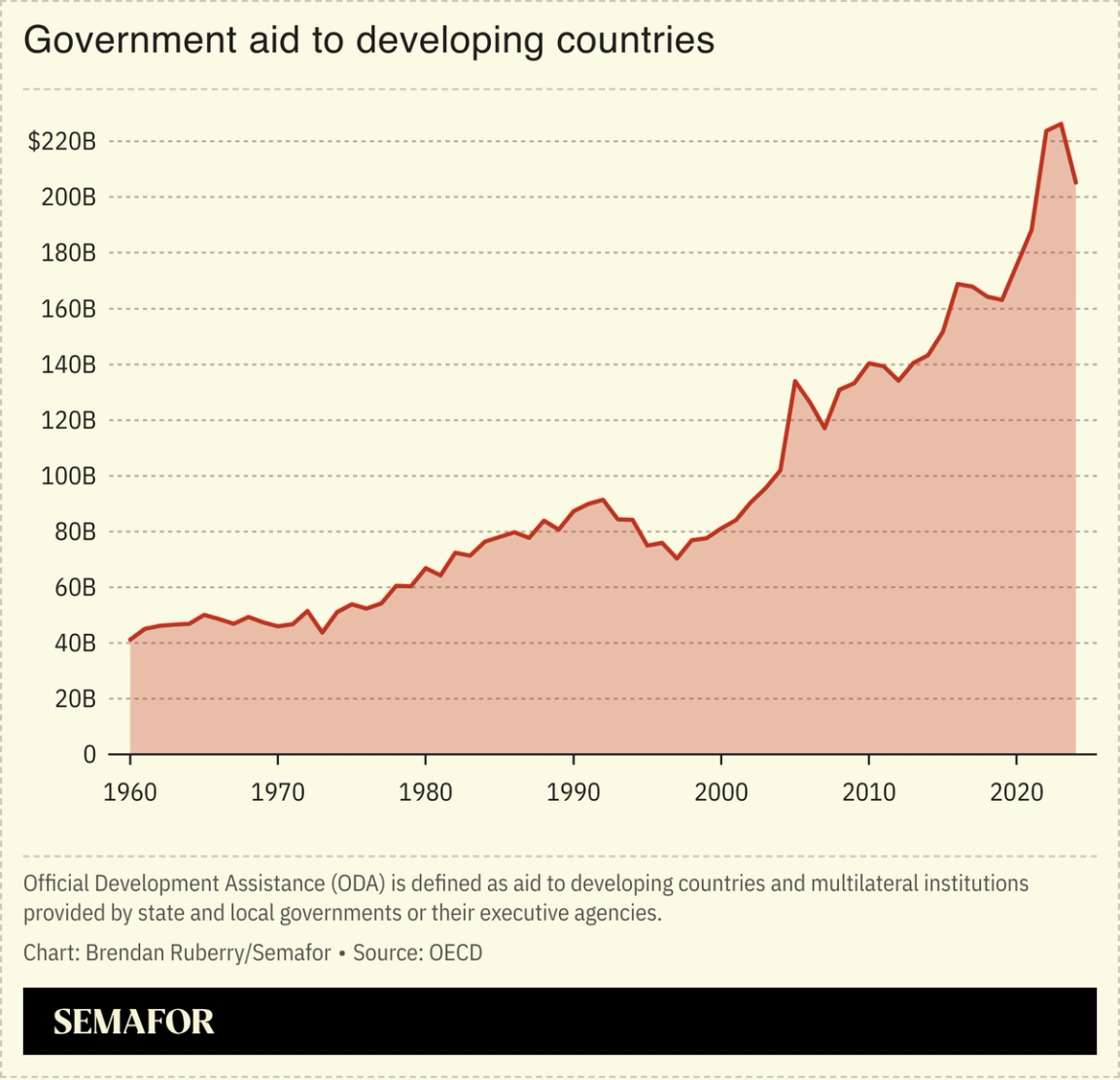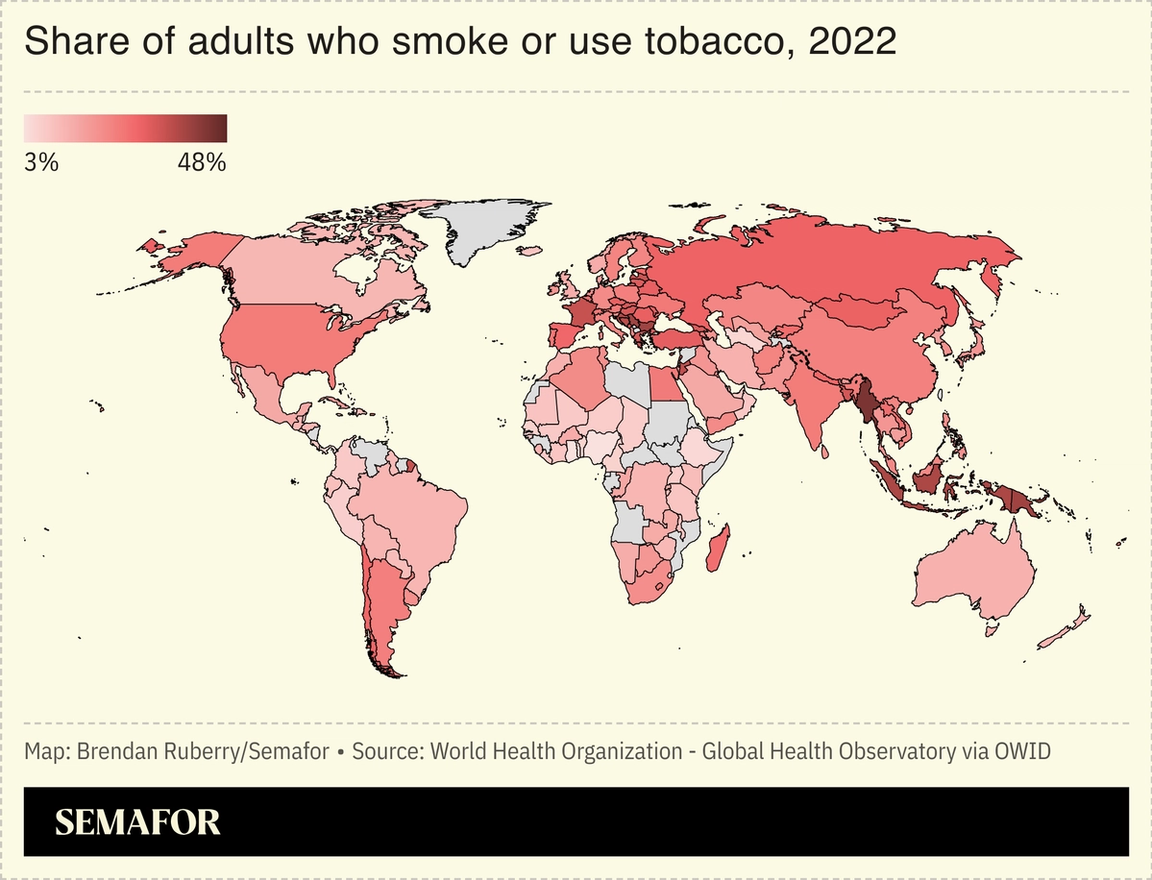| | A new pope is chosen, India and Pakistan trade blame over military escalation, and Bill Gates plan t͏ ͏ ͏ ͏ ͏ ͏ |
| |   VATICAN CITY VATICAN CITY |   KIGALI KIGALI |   JAMMU JAMMU |
 | Flagship |  |
| |
|
The World Today |  - First American pope
- India, Pak trade fire, blame
- US-UK trade deal
- Xi, Putin deepen ties
- MAGA and Maoism
- Gates to give away wealth
- Gaza war looms large in NYC
- Dementia cases in China
- German academic bullying
- Ancient scroll breakthrough
 A book examines the possible origin of hundreds of languages, and a Japan-themed Substack Rojak. |
|
Leo XIV is first American pope |
 Yara Nardi/Reuters Yara Nardi/ReutersThe world’s 1.4 billion Catholics will now be led by the first American pope. Chicago-born Cardinal Robert Francis Prevost, 69, was chosen as Pope Francis’ successor Thursday, after one of the shortest conclaves ever. Prevost, who took the name Pope Leo XIV and called for peace in his first public words, wasn’t considered a frontrunner: His election bucks the long-held belief that cardinals wouldn’t elect a pontiff from a country that already wields immense global influence. But Leo’s language skills and international experience — he has spent much of his life in South America — combined with his role of overseeing global bishops likely helped him, the National Catholic Reporter noted, calling Leo a “private man with a reserved style.” |
|
India, Pakistan trade blame for escalation |
 Akhtar Soomro/Reuters Akhtar Soomro/ReutersIndia and Pakistan blamed each other for military escalations Thursday, the second day of what is seen as their worst confrontation in 20 years. New Delhi said it foiled a drone and missile attack in the Kashmir region, while Pakistan denied responsibility. India first launched missile strikes against Pakistan in retaliation for a recent attack on tourists, but New Delhi is also pursuing “bloodless and more refined” ways to target Islamabad, The New York Times wrote: Officials are pushing to cut foreign aid to Pakistan, and have suspended a crucial water treaty. India’s “multifaceted attempt to squeeze Pakistan” is likely because New Delhi believes that its earlier tactics were insufficient in curbing cross-border terrorism, Foreign Policy wrote. |
|
US, UK announce trade deal |
 Leah Millis/Reuters Leah Millis/ReutersThe US and UK announced a trade pact Thursday, the first deal Washington has struck since President Donald Trump’s “Liberation Day” tariffs were unveiled. Britain agreed to ease market access for American exports including beef and ethanol, while the US will lower tariffs on British steel, aluminum, and automobiles. Notably, the 10% baseline tariff that Trump imposed last month will remain in place for the UK. As other countries hunt for clues on what the US president wants out of a deal, the agreement — which sent Wall Street stocks surging — signals it may be difficult to eliminate duties entirely. “The US is a high tariff country for the foreseeable future, and the trade war continues,” one expert said. |
|
Xi, Putin pledge deeper ties |
 Evgenia Novozhenina/Reuters Evgenia Novozhenina/ReutersChina’s Xi Jinping and Russia’s Vladimir Putin reinforced their close ties Thursday, casting themselves as “friends of steel” against US attempts to contain them. Xi is the most powerful world leader to attend Moscow’s parade Friday marking Nazi Germany’s World War II defeat. He and Putin touted their deepening relationship as crucial to opposing a world order defined by US hegemony: They condemned US President Donald Trump’s plan to build a “Golden Dome” missile defense shield, warning the initiative could transform space into “an arena for armed confrontation.” The Moscow “bro-fest,” Politico’s Phelim Kine wrote, counters the idea that Trump could pull a “reverse Kissinger” by growing closer to Putin and pulling Russia away from China. |
|
Parallels between MAGA, Mao |
 Evelyn Hockstein/Reuters Evelyn Hockstein/ReutersUS President Donald Trump and his Make America Great Again movement hold parallels to Mao Zedong and China’s Cultural Revolution, analysts argued this week. Both men amassed power through a cult of personality and looked to reshape their countries, The Atlantic’s Derek Thompson wrote, noting that MAGA “dreams of sending the liberal elites to the factories and the fields to teach them a lesson.” Trump recently defended tariffs by suggesting Americans should learn to live with fewer dolls; Mao demanded Chinese families sacrifice for the greater good. Like Mao, Trump “relishes disruption and chaos,” a China expert told the Lingua Sinica newsletter. Trump’s efforts to consolidate power mirror how Mao entered “a stage of… extreme power with the Cultural Revolution.” |
|
Gates to give away nearly all of his wealth |
 Bill Gates plans to give away virtually all of his wealth — about $200 billion — over the next 20 years, and sunset the Gates Foundation in 2045. The billionaire philanthropist told Semafor that he is “horrified” by the Trump administration’s cuts to global humanitarian aid programs. “I’d say in the next five years, some of our key figures, like the number of children who die or vaccine coverage levels, some of those will actually go backwards,” Gates said. While the White House’s gutting of USAID could “truly be the end of foreign aid as we know it,” a political economist wrote in Foreign Affairs, it also offers an opportunity to reimagine global development by prioritizing industrialization over charity. |
|
Gaza conflict still roils NYC |
 Ryan Murphy/Reuters Ryan Murphy/ReutersDozens of pro-Palestine protesters at Columbia University were arrested Wednesday as the war in Gaza continues to loom over New York City’s institutions and politics. The “pace and forcefulness” of Columbia’s response drew praise from the White House, marking a shift from last year, when the school was accused of inaction over protests, Bloomberg wrote. The conflict is also shaping the city’s mayoral race: Democratic candidate Andrew Cuomo accused his rivals, including a Jewish opponent Brad Lander, of aligning with the “forces of antisemitism,” while Lander said “politicians who aren’t even Jewish” are “using Jews as pawns to advance their own interests.” And another candidate, Zohran Mamdani, is looking to reconcile his past criticism of Israel with outreach to Jewish voters. |
|
Dementia cases rise in China |
 Dementia case numbers in China are growing faster than almost anywhere else in the world, research found. Cases worldwide went from 22 million in 1990 to 57 million in 2021, a 150% increase, but in China they leapt from 4 million to nearly 17 million, almost a quadrupling. The rise could be largely attributed to demographics — China’s birth rates spiked in the 1950s in a huge baby boom, meaning a large generation is now getting old. A global decline in tobacco use, a major factor in dementia, has not been seen in China, where roughly half of men (though only 2% of women) smoke. Meanwhile, Western lifestyle diseases such as diabetes and obesity are on the rise, New Scientist reported. |
|
Academic bullying rampant in Germany |
 Julian Herzog/Wikimedia Commons. CC BY 4.0 Julian Herzog/Wikimedia Commons. CC BY 4.0Germany has a problem with academic bullying. While it’s a common issue plaguing countries’ universities, the structure of the German higher education system, in which tenured professors are near-untouchable but early career researchers’ positions are precarious, “enables and emboldens abusers,” Nature reported. One report noted that the German system is highly hierarchical and deferential to seniority, creating an extreme power differential. Strict defamation laws, as well as labor laws denying anonymity to whistleblowers, make it difficult to investigate allegations. Reports of academics continuing to work for years despite dozens of credible allegations of abuse, or even documented physical assaults, are rife. “There is far too much power in the hands of professors in the German system,” one researcher said. |
|
Breakthrough in scroll deciphering |
 Herculaneum. Diego Delso/Wikimedia Commons. CC BY-SA 4.0 Herculaneum. Diego Delso/Wikimedia Commons. CC BY-SA 4.0Researchers deciphered the title and author of a still-sealed papyrus scroll burnt to a cinder by the eruption of Mount Vesuvius in AD 79. Hundreds of scrolls were discovered in 1752 in Herculaneum, a Roman town buried by the disaster, but were too fragile to open. The Vesuvius Challenge offered cash to researchers who could decipher them: Breakthroughs have been made, identifying individual words, but this is a “milestone” toward understanding the entire text, Nature reported. The scroll is by the Greek philosopher Philodemus, and the discovery supports claims that the scrolls were part of his personal library. A challenge judge said the pace of discovery was “astounding” and researchers would soon be able to read all of the scroll. |
|
|